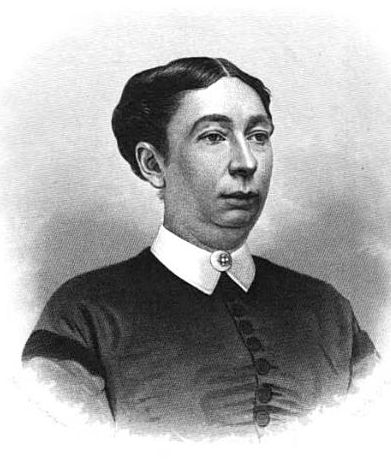Sophronia E. Bucklin, Sanitary Commission Nurse at Gettysburg

Because Emerging Civil War has been commemorating the Battle of Gettysburg, and I have been writing a series of articles about women Civil War nurses, I found a book by Sophronia E. Bucklin recollecting her experience as a Sanitary Commission nurse in Gettysburg just after the battle. In reading her comments about the Confederate soldiers, these are rather slanted toward the Union. I could paraphrase her writing, but her words really paint the description of the aftermath of that battle. I will provide selected passages.
On Saturday we entered the battle town. Everywhere were evidences of mortal combat, everywhere wounded men were lying in the streets on heaps of blood-stained straw, everywhere there was hurry and confusion, while soldiers were groaning and suffering.
Stripped of cattle and sheep – stores and houses robbed, still the people of Gettysburg stood nobly by their defenders. The women brought forth their contributions of bandages and lint, and poured out with unsparing hand their hidden delicacies, such as wines and jellies, like oil upon the sea of suffering humanity.
It seemed impossible to tread the streets without walking over maimed men, who had fallen in the shock of that July’s fire, in which the sun seemed almost intent upon vieing with cannon and rifle in destructive heat. They lay like trees uprooted by a tornado, with summer’s leafy crown upon them…they lay on the bloody ground, sick with the pains of wounds, grim with the dust of long marches and the smoke and powder of battle…
I was told when asking to be directed to the Seminary Hospital, that I was not needed there, but that urgent necessity for woman’s work existed in the field… the patients from the Seminary were soon to brought to the field and that hospital [Seminary] was to be broken up…we took our way up to the hospital ground, where five hundred tents had already been erected…It was the field on which the first guns were fired in that memorable battle.
I felt as though it were profane to speak with even assumed cheerfulness, while treading of it (field of battle), although the long lines of white tents glimmering along the distant wood-side, spoke with a comforting earnestness of the many whom shot and shell, and cold steel had failed to destroy.
A line of stretchers, a mile and a half in length, each bearing a hero, who had fought nigh to death, told us where lay our work, and we commenced it at once. I washed agonized faces, combed out matted hair, bandaged slight wounds, and administered drinks of raspberry vinegar and lemon syrup, while Mrs. Caldwell wrote letters to those who were waiting in dread suspense for news of their soldier, little knowing that he lay stretched on a narrow bed, weak with loss of blood, longing for the presence of those who were glad to be near him with their loving attentions when lying sick beneath the lowly roof among his native hills.
The Sanitary Commission here did its work of mercy. Here it served its legitimate purpose with all the strength of its great humane heart. Without it generous supplies, untold suffering would have visited us, for Government stores could not be obtained, and in view of the host of wounded the ordinary hospital supplies were as a drop of water in the depths of the cool, silent well… The hospital lay in the rear of a deep wood, in a large open field, a mile and a half from Gettysburg, and overlooking it, the single line of rail which connected the battle town with the outer world sweeping it on one side, and winding through the woods. In this open field our supplies were landed from Washington. Whole car loads of bread were moulded through and through, while for a time we were sorely pinched for the necessaries of life.
…, more than half of the wounded men in the hospital were rebel soldiers, grim, gaunt, ragged men – long-haired, hollow-eyed and sallow-cheeked. It was universally shown here, as elsewhere, that these bore their sufferings with far less fortitude than our brave soldiers who had been taught, in sober quiet homes in the North, that while consciousness remained, their manliness should suppress every groan, and that tears were for women and babes.
With the same care from attendants, and the same surgical skill, many more of the rebels died than of our own men – whether from the nature of their wounds, which seemed generally more frightful, or because they lacked courage to bear up under them, or whether the wild irregular lives which they had been leading had rendered the system less able to resist pain, will always remain a mystery with me… Notwithstanding their hostility to us Northerners, I had much respect for them…
Reference:
Sophronia E. Bucklin, In Hospital and Camp: A Woman’s Record of Thrilling Incidents among the Wounded in the Late War, Philadelphia: John E. Potter and Company, 1869.
Nice to have you back, Miz Benson. Nice indeed!
The differences between Union men and Confederate men has been pointed out elsewhere. My favorite is the Rebel Yell. It is usually describes as unearthly and inhuman. And the Yankees? “A manly Huzzah!” I laugh every time.
There probably was little difference—after all, hurt is hurt.